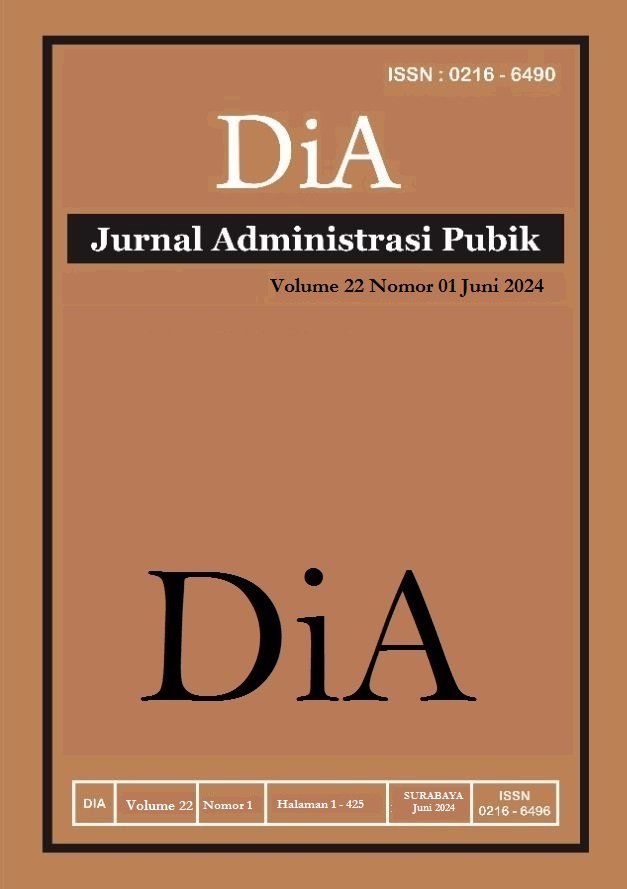M-PASPORT DIGITAL APPLICATION-BASED PUBLIC SERVICE SYSTEM REFORM
DOI:
https://doi.org/10.30996/dia.v22i01.9506Keywords:
electronic government, e-readiness, evaluation, M-Paspor, reformAbstract
Electronic Government, or E-Government, is an information and communication application system that is increasingly being adopted in the government sector in line with technological advancements. The utilization of information technology in governance aids in simplifying the execution of governmental functions as providers of public services. This study delves into the changes or reforms implemented by the TPI Denpasar Class I Immigration Office, under the auspices of the Directorate General of Immigration, utilizing technological advancements in passport services through the M-Paspor digital application. The objective of this study is to analyze the implementation, readiness, inhibiting factors, and evaluate the usage of the M-Paspor application at the Immigration Office Class I TPI Denpasar. The method employed in this study is a qualitative approach with data collection through observation, interviews, and document studies. The study's outcomes reveal that the readiness to implement service through the M-Paspor application at the Denpasar Immigration Office is still suboptimal in accordance with the E-Government Readiness theoretical framework. Factors such as communication infrastructure, connectivity levels, human resource readiness, budget allocation, legal framework, and paradigm shift still require enhancement. Challenges in implementing the M-Paspor application include inadequate application maturity due to frequent disruptions, low employee productivity, societal unpreparedness for change, and uneven information dissemination. Therefore, serious attention from the government is necessary to streamline digital transformation and implement M-Paspor in passport application services. Strategic actions are required to overcome these obstacles and ensure that technology's benefits are maximized in public services.
Downloads
References
Arikunto, S., & Safruddin Abdul Jabar, C. (2008). Evaluasi program pendidikan: Pedoman Teoritis Praktis Bagi Praktisi Pendidikan (Dua). Pt Bumi Aksara.
Chaharani, N. A., Adi, T. P., & Hasmi, D. L. (2020). Penerapan Aplikasi Pendaftaran Antrian Paspor Online (Apapo) Dalam Perspektif E-Government. Jurnal Kebijakan Publik, 11(2), Article 2. Https://Doi.Org/10.31258/Jkp.V11i2.7904
Indrajit, R. E. (2006). E-Government: Konsep Pelayanan Publik Berbasis Internet Dan Teknologi Informasi. Https://Www.Academia.Edu/14190703/E_Government_Konsep_Pelayanan_Publik_Berbasis_Internet_Dan_Teknologi_Informasi
Instruksi Presiden Republik Indonesia No 3 Tahun 2003 Tentang Kebijakan Dan Strategi Nasional Pengembangan E-Government, Pub. L. No. Inpres No 3 Tahun 2003 (2003).
Keputusan Kepala Kantor Imigrasi Kelas I TPI Denpasar Nomor: W20.Imi.Imi.2-Um.01.01-1345 Tahun 2023 Tentang Penetapan Standar Pelayanan Pada Kantor Imigrasi Kelas I TPI Denpasar, Pub. L. No. W20.Imi.Imi.2-Um.01.01-1345 (2023).
Peraturan Menteri Hukum dan Hak Asasi Manusia No 8 Tahun 2014 Tentang Paspor Biasa dan Surat Perjalanan Laksana Paspor, Pub. L. No. Permenkumham No 8 Tahun 2014 (2014).
Peraturan Menteri Hukum Dan Hak Asasi Manusia No 18 Tahun 2022 Perubahan Atas Peraturan Menteri Hukum Dan Hak Asasi Manusia No 8 Tahun 2014 Tentang Paspor Biasa Dan Surat Perjalanan Laksana Paspor, Pub. L. No. Permenkumham No 18 Tahun 2022 (2022).
Peraturan Menteri Pemberdayagunaan Aparatur Negara Dan Reformasi Birokrasi Republik Indonesia Tentang Pedoman Standar Pelayanan, Pub. L. No. Permenpan No 15 Tahun 2014 (2014).
Sosiawan, E. A. (2008). Tantangan Dan Hambatan Dalam Implementasi E-Government Di Indonesia. 10.
Sukmasari, D. S. (2018). Implementasi Pelayanan Administrasi Akademik IKIP PGRI Bojonegoro Berbasis Online. DIA: Jurnal Administrasi Publik, 16(2), 1–18.
Downloads
Published
How to Cite
Issue
Section
License
The DiA journal allows authors to retain the copyright of their papers without limitation. Authors may grant publishers non-exclusive publishing rights to publish articles. Granting first publishing rights to publishers also qualifies as unlimited copyright (because there are no restrictions imposed by publishers on author copyright).







